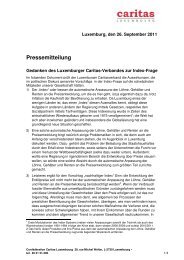Sozialalmanach - Caritas Luxembourg
Sozialalmanach - Caritas Luxembourg
Sozialalmanach - Caritas Luxembourg
Create successful ePaper yourself
Turn your PDF publications into a flip-book with our unique Google optimized e-Paper software.
In short, governments are in principle seeking to establish a “level playing field” for all.<br />
The worry is real that national governments will ultimately fall back to no small degree on<br />
the protection of their own national interests and the search for competitive advantages<br />
of their own financial centers.<br />
It is usually recognized that banks and other financial services providers have supported<br />
and promoted much past economic growth that ultimately benefits all. Innovation, excellence<br />
and flexibility in adjusting to rapidly changing circumstances have all played critical<br />
roles in the financial system’s performance.<br />
There is now however real concern that the structural reforms of the financial system,<br />
involving ever heavier regulation and oversight, will stymie the financial sector’s dynamism<br />
and reduce its ability to provide appropriate funds and impetus to non-financial activities<br />
worldwide. In other words, the emerging financial system, straddled by increased regulation<br />
and oversight under the aegis of pronounced international cooperation, will cause further<br />
drag to worldwide economic recovery.<br />
The duties of banks and other financial services providers<br />
The financial system has so far operated on the basis of assuming its legal duty without<br />
concern for the unintended consequences of its actions. The notion of ethical duty and its<br />
underpinning principles of integrity have so far held no sway in financial behavior. In fact,<br />
governments, investors, civil society bodies and the media have had much to say about the<br />
lack of fairness, transparency, responsibility and accountability in the undertakings of the<br />
financial system. Fairness, transparency, responsibility and accountability are in effect the<br />
core principles of integrity.<br />
The global financial sector must restore trust if it is to fully contribute to overcoming<br />
the crisis. Imposing “proper” financial behavior through law and regulation does nothing to<br />
restore banking reputation and the standing of the banks and other financial services providers.<br />
On the contrary, such rules, regulation and oversight simply highlight and emphasize<br />
the perceived willingness of both banks and other financial services providers to pursue<br />
corporate and personal gain at the expense of investors and all those other stakeholders<br />
directly or indirectly affected, if not afflicted, by the goings on of the financial system.<br />
For trust and reputation to be restored, there is need for a profound change in financial<br />
behavior. Business practices can no longer be driven just by legal duties. It requires banks<br />
and other financial services providers to embrace ethical duties based fully on the principles<br />
of integrity. In other words, the financial sector must shift to a mode of operation that<br />
involves the pursuit of social responsibility as captured in the ESG (environmental, social<br />
and governance) principles and promoted in particular in sustainable and responsible<br />
investments.<br />
213








